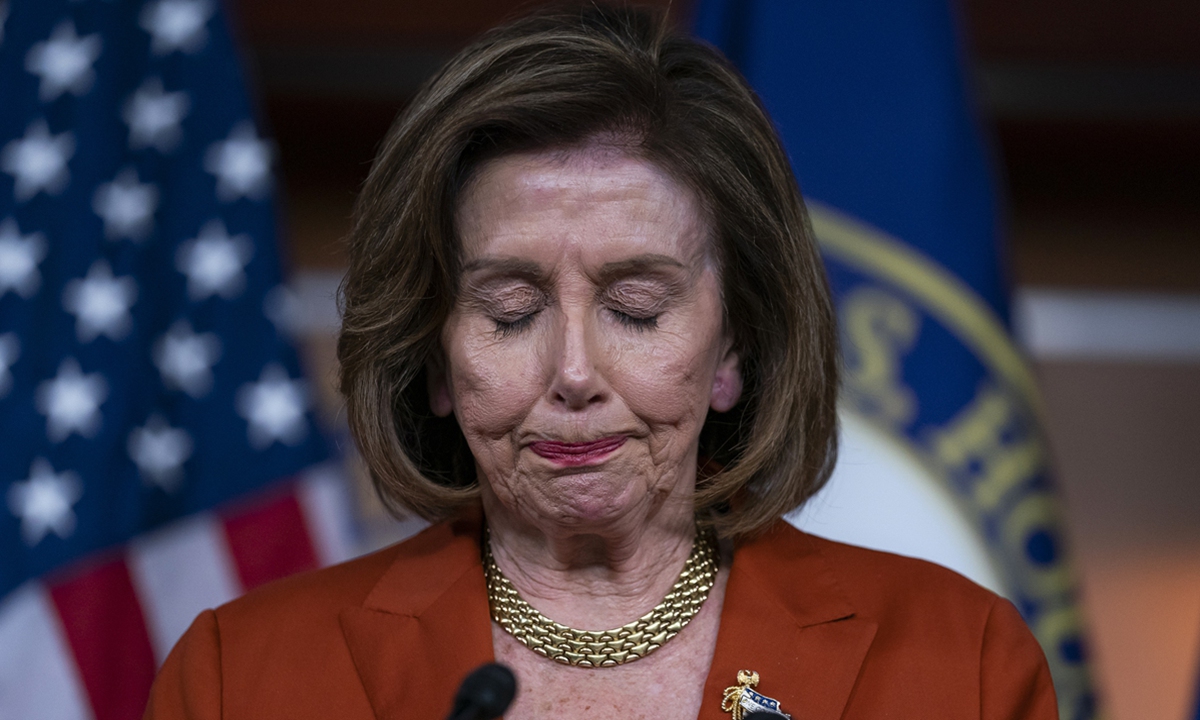
Photo: VCG
In her first interview since she returned from her controversial trip to the island of Taiwan, US House Speaker Nancy Pelosi on Tuesday defended her decision to visit the island on NBC's Today Show. In the interview, Pelosi vividly demonstrated to the audience how a selfish child causes trouble, gets scared, and passes the buck to others.
The context as well as the gaffes of the interview evidently displayed that Pelosi was very tense and troubled. In the interview, she tried to defend her trip by underlining its significance on ideology such as so-called freedom and democracy, but she also claimed that this provocative visit did not violate the one-China policy, noted Shen Yi, a professor of international relations at Fudan University. This is because she is clearly aware that she has stirred up trouble - her reckless visit has severely challenged China's red-line. As a result, instead of playing up the "success" of her visit, she was attempting to shirk her due responsibility.
During the interview, Pelosi said that "it was only about saying, China is one of the freest societies in the world, don't take it from me, that's from Freedom House, it's a strong democracy, courageous people." Soon after Pelosi's tongue slip, Drew Hammill, her deputy chief of staff tweeted that what Pelosi referred here is the island of Taiwan. The transcript of the interview from Pelosi's website also replaced "China" with "Taiwan" in this sentence.
This tongue slip has drawn wide attention and has sparked a new wave of criticism toward her in US' public opinion. Many of those who lash out at Pelosi do not even accept the explanation that such a line is tongue slip.
"This is a consequence of the anti-China and anti-Communist hysteria nurtured by the US. American hostile against China stirred up by China hawks, represented by Pelosi, has entered a state of irrationality and hysteria. And Pelosi, in turn, had to swallow her own bitter fruit," commented Shen.
US President Joe Biden seems to be one of the scapegoats Pelosi is looking for. She said her trip to Taiwan island "followed on the President's direction that we would have a focus on the Asia-Pacific. It also took up his initiative of the Indo-Pacific economic framework. So we went there to listen."
"In the face of the unfavorable public opinion both at home and abroad, which believes her Taiwan trip is reckless and risky, Pelosi is attempting to rationalize and legitimize the visit. After gradually realizing that she could not handle the pressure by herself, Pelosi is trying to drag Biden down," Zhang Tengjun, deputy director of the Department for Asia-Pacific Studies at the China Institute of International Studies, told the Global Times.
But Biden is avoiding being involved into Pelosi's difficult position. Biden told reporters on Monday that Pelosi's decision to go to Taiwan was "her decision." "It is anticipated that Pelosi has talked about the trip to Biden before her departure. Based on the remarks by Biden and Pelosi, they are shifting the blame to each other. This is an embodiment of US political mess and division - even within the Democratic Party, unity is hardly to be achieved and different opinions and even antagonism can still be widely seen," Zhang continued.
Bloomberg on Tuesday posted a piece entitled, "Pelosi Trip Sets Back Biden's Effort to Woo Asia Against China." Such a viewpoint makes sense. Pelosi's Taiwan island visit makes it clearer to Asian countries that various forces in US hope to provoke the cross-Straits situation, which will undermine regional peace and stability. This will trigger grievance among Asian countries, even including US' traditional allies. Furthermore, the divergence between Pelosi and Biden will raise Asian countries' doubt whether the Biden administration can truly fulfill its commitment to the region. Such distrust in Asia is detrimental to the Biden administration's Indo-Pacific Strategy.




